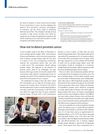 March 2024 in “PLoS medicine”
March 2024 in “PLoS medicine” Physical activity, height, and smoking affect prostate cancer risk.
 March 2011 in “European Urology Supplements”
March 2011 in “European Urology Supplements” The document concludes that a new biosensor can efficiently detect prostate cancer cells and that standardized referrals help find significant cancers effectively.
 February 2007 in “Lancet Oncology”
February 2007 in “Lancet Oncology” Using a single PSA level to decide on a prostate biopsy is not effective; a more personalized approach considering various factors is recommended.
[object Object]  3 citations,
January 2017 in “Revista chilena de nutrición”
3 citations,
January 2017 in “Revista chilena de nutrición” Certain natural compounds called terpenes may help prevent prostate cancer.
 19 citations,
August 2014 in “Journal of Ethnopharmacology”
19 citations,
August 2014 in “Journal of Ethnopharmacology” The study created a test that found hormonal and toxic effects in plant and fungal extracts using prostate cancer cells.
 71 citations,
April 2020 in “Journal of Cosmetic Dermatology”
71 citations,
April 2020 in “Journal of Cosmetic Dermatology” Genetic differences may affect COVID-19 deaths; anti-androgens could be potential treatment.
 April 2024 in “Prostate international”
April 2024 in “Prostate international” Male pattern baldness does not cause an increased risk of prostate cancer.
 9 citations,
July 2018 in “Medicine”
9 citations,
July 2018 in “Medicine” Men with vertex baldness may have a higher risk of developing prostate cancer, but more research is needed to confirm this.
 December 2023 in “International Journal of Molecular Sciences”
December 2023 in “International Journal of Molecular Sciences” Men with early balding showed higher levels of certain genes linked to hair loss and possibly prostate cancer.
 21 citations,
June 2002 in “PubMed”
21 citations,
June 2002 in “PubMed” The conclusion is that there might be a link between certain types of baldness and prostate cancer, which could be due to shared hormonal pathways.
February 2024 in “Cancers” New treatments targeting androgen receptors show promise for drug-resistant prostate cancer.
 10 citations,
June 2010 in “Expert Opinion on Drug Metabolism & Toxicology”
10 citations,
June 2010 in “Expert Opinion on Drug Metabolism & Toxicology” Finasteride reduces prostate cancer risk but may increase high-grade cancer chances.
 January 2019 in “Oncogen”
January 2019 in “Oncogen” Triple Hormonal Blockade (ADT3) can effectively manage prostate cancer but requires careful monitoring for heart risks.
 October 2006 in “Aging Health”
October 2006 in “Aging Health” Dutasteride effectively treats benign prostatic obstruction, improves urinary flow, reduces prostate size, and may prevent prostate cancer, but can cause sexual side effects.
 218 citations,
December 2011 in “Advances in Urology”
218 citations,
December 2011 in “Advances in Urology” The document concludes that the 5 alpha-reductase enzymes are important in steroid metabolism and related to various human diseases, with inhibitors used to treat conditions like male pattern baldness and prostate issues.
 61 citations,
May 2010 in “Integrative Cancer Therapies”
61 citations,
May 2010 in “Integrative Cancer Therapies” There is no clear recommendation for using selenium in cancer patients; it may be beneficial to correct low selenium levels before treatment.
 7 citations,
January 2016 in “British Journal of Cancer”
7 citations,
January 2016 in “British Journal of Cancer” Men with certain types of baldness at age 45 may have a higher risk of colon cancer and colorectal adenoma.
 March 2023 in “Translational Andrology and Urology”
March 2023 in “Translational Andrology and Urology” 5-alpha reductase inhibitors, like finasteride and dutasteride, are used for prostate issues, hair loss, and excessive hair growth, may help with COVID-19, but can cause sexual and mental health side effects, and their use in preventing prostate cancer needs more examination.
 25 citations,
June 2019 in “Endocrine Related Cancer”
25 citations,
June 2019 in “Endocrine Related Cancer” Mutations in certain receptors can cause diseases and offer new treatment options.
[object Object]  September 2012 in “African Journal of Urology”
September 2012 in “African Journal of Urology” Testosterone replacement therapy improves libido, mood, muscle strength, and bone density in men with Testosterone Deficiency Syndrome.
 1 citations,
December 2017 in “Journal of The European Academy of Dermatology and Venereology”
1 citations,
December 2017 in “Journal of The European Academy of Dermatology and Venereology” Vertex baldness has higher DHT levels than frontal baldness, but testosterone and PSA levels are similar.
 20 citations,
August 2016 in “International Journal of Cancer”
20 citations,
August 2016 in “International Journal of Cancer” Men with male pattern baldness have a higher risk of certain skin cancers, especially on the scalp.
 June 2006 in “American Journal of Epidemiology”
June 2006 in “American Journal of Epidemiology” Being obese and eating too many calories may increase the risk of kidney cancer, but physical activity doesn't seem to affect this risk.
 2 citations,
January 2019 in “BMC Cancer”
2 citations,
January 2019 in “BMC Cancer” Baldness may lower the risk of testicular cancer.
 139 citations,
December 2020 in “Cell Stem Cell”
139 citations,
December 2020 in “Cell Stem Cell” Male hormones affect COVID-19 severity and certain drugs targeting these hormones could help reduce the risk.

Early-onset baldness is linked to genetics, lifestyle, and can indicate higher risk for heart and metabolic diseases, and affects mental health.
 September 2016 in “Springer eBooks”
September 2016 in “Springer eBooks” Looking older on the outside might be linked to aging faster on the inside and can be affected by lifestyle choices and health risks.
 78 citations,
August 2012 in “Human molecular genetics online/Human molecular genetics”
78 citations,
August 2012 in “Human molecular genetics online/Human molecular genetics” A new gene, JMJD1C, may affect testosterone levels in men.
 42 citations,
June 2020 in “Seminars in Oncology”
42 citations,
June 2020 in “Seminars in Oncology” Sex hormones may affect COVID-19 severity, with men often faring worse, and targeting related pathways could offer treatment options.
 29 citations,
October 2011 in “British Journal of Dermatology”
29 citations,
October 2011 in “British Journal of Dermatology” Certain microRNAs are more common in balding areas and might be involved in male pattern baldness.





























